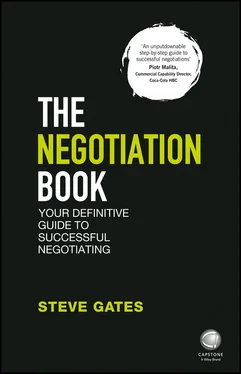• Do you start out with an extreme opening on price?
• Do you introduce conditions that you are ready to concede on?
• Do you build in red herrings (issues that are not real, that you can easily, and you expect to, concede)?
The psychological challenge here is to provide the other party with the satisfaction of having achieved, through hard work, a great deal for themselves . In other words letting them “win,” or letting them have your way.
Negotiating versus selling
It is a commonly held view that a good “sale” will close itself and that negotiation follows only when outstanding differences remain. However, negotiation as a skill and as a process is fundamentally different from selling. To sell is to promote the positives, the match, to align the solution to the need. It requires explanation, justification, and a rational case. “The gift of the gab” is associated with the salesman who has an enthusiastic answer for everything. Negotiation does not. Although relationships can be important, as is the climate for cooperation (without which you have no discussion), the behavior of the Complete Skilled Negotiator also involves silence, where appropriate. That means listening to everything the other party is saying, understanding everything they are not saying, and working out their true position.
silence
Silence offers you the time to think and contemplate before responding. It allows you to listen to the other party to really understand. It requires discipline and concentration. The unnerving consequence of silence is that the other party continues to talk and ultimately make unplanned concessions. At the very least they often provide you with more information than they intended.
Negotiation involves planning, questioning, listening, and making proposals, but it also requires you to recognize when the selling has effectively concluded and the negotiation has begun. If you find yourself selling the benefits of your proposals during a negotiation, you are demonstrating a weakness and probably giving away power. It suggests that you don’t feel that your proposals are strong enough and that they require further promoting. The more you talk, the more you are likely to make a concession.
So, recognizing when the change from selling to negotiating has taken place is critical. You are now negotiating. It is simple enough to shut up, listen, and think, whilst exercising patience. If this silence feels uncomfortable, it is; because you are now negotiating.
Values such as fairness, integrity, honesty, and trust naturally encourage us to be open. Personal values have their place within any relationship but business relationships can and often do exist, based on different value sets.
Values are usually deep-rooted and many people feel very defensive about them, as if their very integrity was being challenged. The point here is that they are not right or wrong. I am not suggesting that effective negotiators have no values – we all do. However, in negotiation, when you are involved in a process, what you do and what you are need not be the same thing. This is not about challenging who you are, but it is about helping you to change the things you do .
If you want to remain loyal to your values during negotiation there is nothing wrong with this. However, others may not be as faithful to theirs, which could leave you compromised. In other words, if you choose to be open and honest by, for example, sharing information with the other party and they decide not to reciprocate, guess who will gain the balance of power? And how appropriate is that?
Where natural economic laws, such as supply and demand, result in people doing business with each other, a cooperative relationship can help to create greater opportunities but it is not always critical. Trust and honesty are great corporate values: they are defendable and safe, especially when you have a business involving hundreds or thousands of people buying or selling on behalf of one business. They also help promote sustainable business relationships. However, in a negotiation, these values can be the root of complacency, familiarity, and even lazy attitudes that end up costing shareholders money. I remain a strong believer in collaborative relationships but with the emphasis on optimizing value whilst ensuring the best interests of all involved.
The case for collaboration
If you prefer collaborative negotiations it could be because:
• you need the commitment and motivation of the other party in order to deliver on what you have agreed;
• you prefer to work within a range of variables that allow you to consider all of the implications and the total value in play;
• you regard it as a better way of managing relationships; or
• you simply fear conflict and the potential negative consequences of the negotiation breaking down.
Whatever your reason, you should ensure that it is because it’s more likely to meet your objectives rather than simply a style preference that provides for a comfortable environment. How appropriate this is depends on how honest you are with yourself about your motives and the benefits that collaboration will bring.
It is often difficult to work out how good a deal you really have secured following a negotiation. This would be far easier to work out if, when we reviewed our performance, self-justification was left out of the equation. Have you ever asked yourself: “If I had performed differently or taken different decisions, could I have secured a better deal?” It is easier to move on rather than reflect on our performance and consider the what and the why, and of course the resulting quality of the deal we finished up with. Learning something from each negotiation ensures that, where unplanned compromises have taken place, you take away some value from the experience. This requires honesty with yourself. The following four areas provide a useful frame of reference for review, and as preparation for your next negotiation.
The four challenges we face
Challenge 1: This is all about you
Negotiation is uncomfortable. It sometimes involves silence, threats, and consequences that many find difficult environments to perform well in. If you are to perform well, you will need to accept responsibility for your actions and recognize the significant difference your performance can make to every agreement you are involved in.
The art of negotiation can be learned and applied, but you must have the self-motivation for change and the ability to be flexible. This is not just about being tough or being prepared. It is firstly about being motivated by the prospect of creating value and profit from well-thought-through agreements. You should therefore recognize that your past performance is no indication of your future performance, especially as every negotiation is unique, like every basketball or football game.
So, the first challenge is you. It is people who negotiate; not machines, or companies. We all have prejudices, values, ideologies, preferences, pressures, objectives, and judgment, as will the other party in your negotiations. So one part of our journey will involve you understanding why your greatest challenge in negotiation is yourself and how, by nature, you naturally see the world from your perspective rather than that of others.
The simple process of an exploratory meeting, patience, and seeking to work with someone rather than to assume and then impose ideas on that person, is key to understanding how others see the world and what their objectives are when you are both selling and negotiating. As an effective negotiator you need to be able to understand the dynamics of any situation from “inside” the other party’s head. Without this insight, you will remain in a state that we at The Gap Partnership call “being inside your own head,” which is a dangerous place to be during negotiation. If you really want to negotiate effectively, you first have to get your thinking this way round.
Читать дальше












